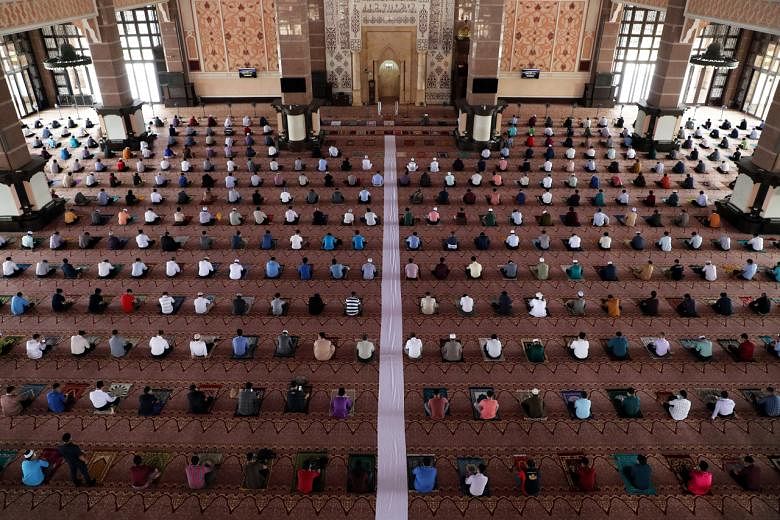KUALA LUMPUR - With Malaysia's Covid-19 situation worsening with a record daily increase of 871 cases on Sunday, people are questioning government flip flops over restrictions in the Klang Valley even as Prime Minister Muhyiddin Yassin's government is at risk of collapse.
Just days after announcing that tighter controls would begin on Oct 14, the government suddenly allowed mosques, gyms and parks to reopen. It also increased the maximum number of restaurant diners per table from two to four, raising the ire of some Malaysians who say the Conditional Movement Control Order (CMCO) seemed to be a waste of time.
In yet another about-face, the government on Monday (Oct 19) said it was mulling an even stricter lockdown, causing further frustration among Klang Valley residents.
"We have received many views and complaints. There are quarters who called for stricter control, but there are also those who think otherwise," said Senior Minister-in-charge of Security Datuk Seri Ismail Sabri.
"Nevertheless, we must create a balance between reviving the economy and protecting the people from the virus," he said.
On Tuesday (Oct 20), he announced yet another new ruling: Klang Valley residents must work from home from Thursday.
Malaysia is now experiencing its worst wave of the coronavirus.
Across the South China Sea, Sabah's Covid-19 situation is increasingly dire with resources stretched thin, prompting the federal government to fly front liners into the state and send in the military to set up field hospitals.
Sarawak may be the next Covid-19 battleground as some politicians are pushing for state polls soon even though they are not due until mid-2021.
"The U-turns make it seem like the government is bowing down to populist demand. Our positive cases are higher and more widespread than during the earlier lockdown in March, but the measures are more relaxed," said KL resident Susan Lim, 50.
The CMCO in Kuala Lumpur, Selangor and Putrajaya is expected to end on Oct 27 but health experts have said there may be a need to extend it if the outbreak does not improve.
PM Muhyiddin was seen previously as having managed the outbreak well but this view is fast waning, with politicians seemingly distracted by ongoing power grabs and the constant U-turns.
Many also blame the Sabah state elections for causing the country's third Covid-19 wave.
Political analyst Awang Azman Awang Pawi of Universiti Malaya said: "Muhyiddin's position is increasingly shaky, he is becoming unpopular as many Malaysians are unhappy over how the current outbreak is handled.
"The government needs to be firmer in handling the outbreak. Flip flops will just create confusion among the people, and the government will be seen as lacking a clear policy and stance in the fight against Covid-19.
"This will lead to a further lack of confidence in the Perikatan Nasional administration and Muhyiddin's premiership."
There are also concerns on how a snap general election, if called, could lead to a further escalation of Covid-19 cases.
Sabah, the epicentre of the current outbreak, is still charting the highest number of cases daily, with 673 on Tuesday, out of 862 recorded nationwide.
"The community transmission is very widespread in Sabah and it is getting exceedingly difficult to contain the spread now. I think a shift in the overall strategy for Sabah is warranted," said Professor Datuk Dr Awang Bulgiba Awang Mahmud, Universiti Malaya epidemiologist.
As for the Klang Valley, health authorities have ruled out, for now, a return to the stricter Movement Control Order (MCO) which saw all non-essential businesses and schools shut between March 18 and May 4.
"An MCO probably will work in a shorter period of time but will cost the country economically," Health Director-General Noor Hisham Abdullah said at the health ministry's daily news conference on Tuesday.
He noted that the national reproduction number (Rt) had dropped in the last week to 1.5 from 2.2, adding that the aim was to achieve an Rt of 0.3.
The Rt refers to the infection rate and estimates the average number of people that one patient can infect.
Selangor, which has also been hard-hit by the pandemic, has seen its Rt drop from 1.98 to 1.48 in the last week, he added.
But some, like Madam Lim, still believe tighter restrictions are needed.
"We can't afford more disruptions to the economy but surely a short but strict lockdown is better than a prolonged one that allows so much movement," she said.


